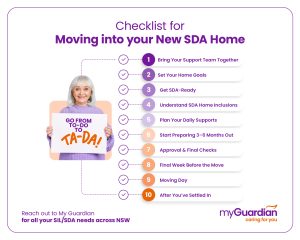In this article
In Australia, the National Disability Insurance Scheme (NDIS) has transformed the landscape of disability services. By providing individuals with disabilities access to tailored services and funding, NDIS services are unlocking potential and enabling individuals to lead fulfilling lives. This comprehensive guide explores how NDIS services are making a difference, the types of support available, and the profound impact it has on the lives of individuals and their families.
What is NDIS – Disability Services?
The National Disability Insurance Scheme (NDIS) is a government initiative designed to support Australians with permanent and significant disabilities. The scheme provides funding for a range of support services tailored to individual needs, helping participants achieve their goals and enhance their quality of life. NDIS services focus on empowering individuals to live independently, participate in their communities, and access the necessary resources to thrive.
The NDIS is built on the belief that people with disabilities have the right to make choices about their lives and the support they receive. This personalised approach enables individuals to access services that align with their aspirations, whether that means pursuing education, finding employment, or engaging in recreational activities.
The Key Benefits of NDIS Services
NDIS disability care offers a wealth of benefits that go beyond mere financial assistance. Here are some key ways in which the NDIS is making a meaningful impact:
1. Personalised Support Tailored to Individual Needs
One of the standout features of NDIS disability services is its focus on personalised support. Each participant undergoes an assessment to identify their specific needs, goals, and preferences. This process leads to the creation of a tailored support plan that outlines the types of services and funding required to achieve individual objectives.
Whether it’s assistance with daily living activities, therapy services, or community engagement, NDIS disability care ensures that participants receive the support they need to thrive. This tailored approach empowers individuals to take control of their care and make informed choices about their support services.
2. Empowering Independence and Self-Determination
NDIS services are fundamentally about promoting independence. By providing the resources and support necessary for individuals to manage their daily lives, the NDIS encourages self-determination. Participants are empowered to set their own goals, make decisions about their care, and take active roles in their communities.
This emphasis on independence has a significant impact on individuals’ confidence and self-esteem. When people with disabilities are equipped to make choices about their lives, they often experience a greater sense of control and purpose.
3. Enhancing Quality of Life
This government-funded disability service program plays a crucial role in enhancing the quality of life for individuals with disabilities. By providing access to essential services such as personal care, therapy, and community participation, NDIS disability care helps individuals engage in meaningful activities and relationships.
Access to support also reduces isolation and promotes social inclusion. Participants can connect with others in their communities, build friendships, and engage in social activities that enhance their overall well-being. The NDIS aims to create an environment where individuals can thrive, ultimately improving their quality of life.
4. Supporting Families and Caregivers
The impact of NDIS services extends beyond the individual to their families and caregivers. The support provided through the NDIS alleviates some of the pressures faced by families who may otherwise shoulder the entire burden of care.
With access to funded services, family members can take breaks, knowing their loved ones are receiving professional support. This respite care is invaluable, allowing caregivers to recharge and maintain their well-being. The NDIS acknowledges the vital role that families play in the lives of individuals with disabilities and seeks to support them as well.
5. Providing Access to Diverse Services
NDIS disability care offers a wide range of services tailored to meet the unique needs of each participant. Some common types of support include:
- Personal Care Assistance: Help with daily living activities such as bathing, dressing, and meal preparation.
- Therapeutic Services: Access to occupational therapy, physiotherapy, speech therapy, and psychological support to enhance physical and mental well-being.
- Community Participation: Opportunities for social engagement, recreational activities, and skill development, enabling individuals to connect with others and pursue their interests.
- Supported Employment: Assistance in finding and maintaining employment, helping individuals to gain valuable skills and contribute to the workforce.
- Transport Assistance: Funding for transport to appointments, social activities, or community events, ensuring individuals can remain active and engaged.
This diverse array of services allows participants to access the support they need to achieve their goals and live fulfilling lives.
How to Access NDIS Disability Care
Accessing NDIS disability care involves several steps, which are designed to ensure that individuals receive the appropriate support. Here’s a general overview of the process:
1. Eligibility Check
Individuals must first determine their eligibility for the NDIS. This involves meeting specific criteria, including age, residency, and disability requirements. The NDIS website provides information on eligibility and how to check your status.
2. Application
Once eligibility is confirmed, individuals can submit an application for access to the NDIS. This application requires information about the individual’s disability, functional capacity, and support needs.
3. Planning Meeting
After the application is approved, a planning meeting is scheduled. During this meeting, participants discuss their goals, support needs, and preferences with an NDIS planner. This collaborative approach ensures that the resulting support plan is tailored to the individual’s unique circumstances.
4. Implementation of the Plan
Once the support plan is finalised, participants can begin accessing the services outlined in their plan. This may involve engaging with service providers, coordinating therapies, and utilising funding for necessary support.
5. Regular Review and Adjustment
The NDIS is committed to ongoing support, which includes regular reviews of each participant’s plan. These reviews ensure that the support provided remains relevant and effective, allowing for adjustments as needs change over time.
Read full: A step-by-step guide on how to apply for NDIS
The Transformative Impact of NDIS Disability Care
The NDIS has had a transformative impact on the lives of countless individuals with disabilities. By unlocking potential and providing access to tailored support, NDIS disability care empowers individuals to pursue their goals, engage with their communities, and live more fulfilling lives.
Real-life stories illustrate the profound difference that NDIS support can make. Many participants have reported improvements in their mental and physical well-being, increased social connections, and a greater sense of independence. Families have experienced reduced stress and enhanced relationships, as they are supported in their caregiving roles.
Addressing Common Misconceptions About the NDIS
Despite its widespread impact, the NDIS is often misunderstood, leading to confusion among potential participants and their families.
One of the most common misconceptions is that the NDIS only supports individuals with physical disabilities. In reality, the scheme covers a wide range of disabilities, including intellectual, cognitive, sensory, and psychosocial disabilities.
Another misunderstanding is that participants must use only registered NDIS providers. While NDIA-managed participants are limited to registered providers, those who self-manage or have plan management can access a broader range of services.
Additionally, some believe that once an NDIS plan is in place, it remains fixed and cannot be changed. However, the NDIS allows for regular plan reviews to accommodate evolving needs, ensuring that participants receive the most relevant support.
By addressing these misconceptions, individuals can make more informed decisions about their care and access the full benefits of the scheme.
Understanding NDIS Plan Management Options
Navigating the financial aspects of NDIS funding is an essential part of maximising support, and participants have three management options available.
Self-management allows participants to take full control of their funding, giving them the flexibility to choose providers and manage their own payments. While this offers autonomy, it also requires careful budgeting and administrative oversight.
Plan-managed funding, on the other hand, involves engaging a financial intermediary who handles payments and record-keeping on behalf of the participant, reducing administrative burdens while still offering provider choice. Lastly, NDIA-managed plans restrict funding to registered providers, with the NDIA handling financial transactions directly.
Each approach has its advantages, and participants should select a management style that best aligns with their needs and ability to navigate financial processes.
Explore our Plan Management Services
Admin and financial assistance to monitor your expenditures and optimise your NDIS funding.
Selecting the Right NDIS Provider
Choosing the right NDIS provider is a crucial decision that impacts the quality of care and support a participant receives.
When selecting a provider, it is important to consider their expertise in working with specific disabilities, as well as their ability to offer flexible and personalised services. A reputable provider should prioritise individual goals, ensuring that support is tailored to enhance independence and well-being.
Additionally, participants should assess the provider’s availability and reliability, particularly in areas with limited service options. Reading reviews, seeking recommendations, and conducting initial consultations can help individuals determine whether a provider aligns with their expectations.
Since NDIS funding is designed to empower choice, it is essential that participants feel confident in their providers’ ability to deliver high-quality and person-centred care.
Read full: Choosing the Right Disability Care Service Provider: A Comprehensive Overview
Conclusion
NDIS disability care is a powerful force for change, unlocking the potential of individuals with disabilities and enabling them to lead meaningful, independent lives. Through personalised support, the promotion of independence, and access to diverse services, the NDIS is helping to create a more inclusive society.
As more individuals benefit from NDIS disability care, it is clear that this initiative is not only transforming lives but also fostering a greater understanding and acceptance of disability within the community. By embracing the principles of empowerment, choice, and inclusion, the NDIS is paving the way for a brighter future for individuals with disabilities and their families across Australia.
We are here to help
If you need help, contact My Guardian for personalised support. As a registered NDIS provider, we are here to guide you through the process, answer any questions, and help you understand your care options. Visit our Contact Us page, email us at services@myguardian.com.au, or call 02 9336 7555 to connect with one of our friendly professionals today.






